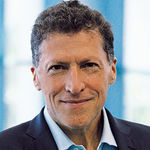
Arnie Weissmann
In his latest book, "Nexus" (Random House, 2024), Yuval Noah Harari examines the impact that information systems have had on civilizations throughout history and contrasts societies and institutions that have "self-correcting mechanisms" with those that don't.
A free press, independent judiciary and a system of checks and balances are self-correcting mechanisms for governments; science advances by challenging and replacing existing theories with ones that edge closer to objective reality.
But governments and institutions that follow an allegedly infallible philosophy or leader and provide no avenue for dissenting voices (or actively suppress them) would be examples of structures that lack robust paths for self-correction. Autocratic or totalitarian governments and many religions are among the examples he cites.
I'd assume that most businesses and industries are self-correcting. If competitors are grabbing market share, profits are falling or investment is hard to attract, a company will replace its leadership, pivot its strategy or prepare to file for Chapter 11.
The business press, blogs, vlogs, social media and podcasts play a role in the travel industry's self-correcting ecosystem. Travel has its share of pundits and critics, some insightful and some ill-informed.
As you might expect, I consider Travel Weekly's own staff columnists and regular contributors to our Opinion sections among the insightful, but I'd add that there are other important industry voices praising, critiquing and, on occasion, moving things forward for the industry's ultimate judges: the traveling public.
I don't always agree with those I read, listen to or watch regularly, and they are not always proven right. But their general knowledgeability and thoughtfulness are, I believe, deserving of a wider industry audience.
Here's a short list of my favorite travel pundits:
• Industry speaker and consultant (and former Travel Weekly "ReThinking Tourism" columnist) Doug Lansky's thought-provoking and entertaining videos address a wide swath of industry issues, from overtourism to sustainability. He offers critiques, praise and most importantly, original approaches to solving problems. He's building a substantial following on YouTube, where you can find him and subscribe to his channel.
• Chris Elliott, also a Travel Weekly alumnus, has made a name for himself as a consumer advocate in travel. The cases he chooses to follow up on tend to be ones that are representative of issues that impact many people. Like other consumer advocates, he can get the attention necessary to effect change for the person who wrote to him, but I suspect those who are on their own may have less success. Nonetheless, his columns are an important vehicle for airing issues that some companies would rather keep out of the spotlight.
• The writing of Singapore-based Yeoh Siew Hoon, founder and managing director of Web in Travel, appears occasionally in Travel Weekly under the title "Postcard from Asia," but she is a prolific writer who focuses on travel technology from a global perspective that is often overlooked by Western audiences. Her warmth -- she often injects her personal life into her commentary -- makes her an especially engaging read.
• Hedge fund manager (and Altimeter CEO) Brad Gerstner and venture capitalist (and Benchmark Capital general partner) Bill Gurley's "BG2" isn't specifically about travel, but Gerstner's impact on travel includes seeing, early on, potential in Priceline, ITA Software and HotelTonight; he also pressured United Airlines' board to make changes he wanted.
• Former cruise executive Herb Hiller created the "Good Tourism Blog" at age 93 with the goal of having the travel industry address climate change as an issue that must be faced much more urgently than it is by the industry today. He is not anti-travel but believes scientists deserve a seat on tourism boards and the boards of directors of travel companies. He can be didactic at times, but his passion and persistence are impressive.
• Longtime travel television commentator Peter Greenberg has presented his opinions about travel on the "Today Show," "Good Morning America" and "CBS Morning News" (he's currently travel editor for CBS News) as well as on radio, PBS series and specials and in books and keynote speeches. He's successfully managed the balancing act of being both a travel industry insider and outsider, and as network television slowly implodes, it'll be interesting to watch where he heads next to fill the vacuum it will leave.
I asked a few of Travel Weekly's beat reporters who they would recommend following. Aviation senior editor Robert Silk is a fan of Brett Snyder, aka the Cranky Flier, a travel agent and aviation insider who Silk believes is exceptional in understanding and presenting the nitty-gritty of airline strategy and operations.
A skiing enthusiast, Silk also enjoys Stuart Winchester's "Storm Skiing Journal and Podcast."
Cruise senior editor Andrea Zelinski finds luxury travel advisor Eric Goldring of Goldring Travel an interesting and sometimes controversial read.
Collectively, these and many other observers are part of the industry's self-correcting mechanism. It may not be fun to be in their sights, but they move the industry forward, albeit in staggering, uneven steps.